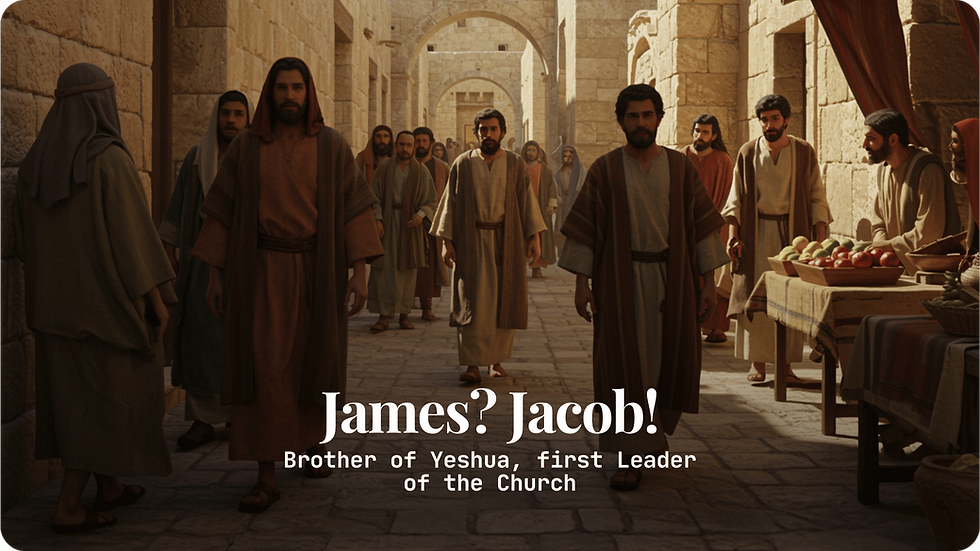Why the Rabbis Don’t Understand Rosh Hashanah
- Ron Cantor

- Sep 22, 2025
- 3 min read


Every year, Jewish people celebrate something rather unusual: a New Year in the middle of the year. We call it Rosh Hashanah. But here’s the surprise—it’s not actually in the Bible. At least, not as a “new year.”
The Scriptures only say:
“On the first day of the seventh month hold a sacred assembly and do no regular work. It is a day for you to sound the trumpets.”
(Numbers 29:1)
And again:
“On the first day of the seventh month you are to have a day of sabbath rest, a sacred assembly commemorated with trumpet blasts.”
(Leviticus 23:24–25)
Notice what’s missing? No mention of Rosh (head) HaShanah (of the year). Instead, this happens on “the first day of the seventh month.” Biblically, this feast is called Yom Teruah—the Feast of Trumpets.
A Feast Without an Explanation
The Torah simply commands trumpet blasts, but gives no reason why. That seems odd—unless the purpose was meant to be revealed later.
Tradition connects it to repentance, since Yom Kippur follows just ten days later. Certainly, trumpets in Scripture carried many meanings:
• Numbers 10: Silver trumpets summoned Israel to assemble or go to war.
• Psalm 81:3: The ram’s horn was sounded at monthly New Moon festivals.
But I believe the true fulfillment of Yom Teruah points to something far greater: the coming of the Messiah.
The Prophets and Apostles Reveal the Mystery
Zechariah foresaw it:
“The Sovereign Lord will sound the trumpet; he will march in the storms of the south.”
(Zechariah 9:14)
Yeshua confirmed it:
“He will send his angels with a loud trumpet call, and they will gather his elect from the four winds…”
(Matthew 24:31)
Paul explained it:
• “In a flash, in the twinkling of an eye, at the last trumpet… the dead will be raised imperishable, and we will be changed.” (1 Corinthians 15:52)
• “For the Lord himself will come down from heaven… with the trumpet call of God, and the dead in Messiah will rise first.” (1 Thessalonians 4:16)
And Revelation declares:
“The kingdom of the world has become the kingdom of our Lord and of his Messiah, and he will reign for ever and ever.”
(Revelation 11:15)
The Feast of Trumpets is nothing less than a prophetic rehearsal of Messiah’s return.
Why Call It a New Year?
So how did Yom Teruah become Rosh Hashanah? I believe it happened because the rabbis—who would also miss the revelation of Yeshua years later—also missed the true meaning of the feast. Seeking to give it weight, they declared it the anniversary of creation. To this day, most Jews accept that without question, though Scripture offers no support.
There’s another layer: the Babylonian exile. The seventh month is called Tishrei—a Babylonian name. Originally, Hebrew months were simply numbered (first, second, third, etc.), with a few exceptions (Aviv, Ziv, Etanim, Bul). The Babylonians, who marked their own New Year in Tishrei, celebrated it with fervor. It’s quite possible the rabbis adopted that framework, merging Yom Teruah with a New Year already familiar in exile.
The True Meaning for Believers
Whatever the history, the biblical heart of this feast remains: the trumpet blast announcing the return of the King.
Yom Teruah is not just about looking back—it’s about looking forward. One day soon, Messiah will come, defeat the enemies of Israel (Zechariah 14:3–4), and establish His kingdom on earth.
As believers, we can mark this day by praying with urgency for His return and preparing our hearts for that great trumpet sound.














I've seen it explained this way: "[Yom Teruah] also marks the ending and beginning of time periods, such as a Shemitah. See Exodus 34:22 “Observe the festival of Shavu‘ot with the first-gathered produce of the wheat harvest, and the festival of ingathering [Sukkot] at the turn of the year." Sukkot is in Tishri right after Rosh HaShanna (so the Jewish new year really is the turn of the year)."